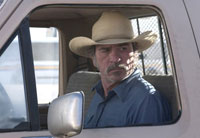Tommy Lee Jones wrote his Harvard thesis on Catholic writer Flannery O’Connor. At the time it no doubt seemed like a subject with little relevance to the craft of filmmaking, but, in The Three Burials of Melquiades Estrada, it serves him remarkably well. Jones himself has admitted that the spirit of O’Connor looms heavy on his directorial debut, and indeed, Jones’ first solo flight bears uncanny aesthetic and theological similarities to O’Connor’s short fiction—dark humor, startling violence, spiritual restlessness, a flare for the grotesque, and a keen understanding of man’s depravity that will doubtless strike some moviegoers as mere misanthropism.
Of course, O’Connor’s stories were all set in the American Southeast—usually Georgia—while Jones’ film is a Western, set in both Texas and upper Mexico. Aside from that, though, you’d swear Jones had uncovered the great lost Flannery O’Connor story and turned it into a movie. He clearly views the world through a pair of O’Connor shaded glasses—he views humanity as twisted and ridiculously monstrous creatures that seem hell-bent on their own destruction. Maybe he’s being too cynical, or maybe he’s read the first chapter of Romans. Either way, Jones doesn’t let his fiendish, freakish cast of characters turn his movie into a downer—like O’Connor, he mines the darkness and finds in it a gleaming sense of the absurd. Is it dark? Heck yeah. But it’s also sharply funny, even when it cuts so close to the bone it makes us feel more than a little uncomfortable.

As the title implies, Three Burials is a movie about death, but, more than that, it’s a movie about friendship, grace, justice, and above all redemption. Jones stars as Pete, a rugged Texas cowboy who’s hard up for a new hand to help him with his daily chores. Help comes in the form of Melquiades (Julio Cedillo), a Mexican alien looking for work to help support his wife and three kids. Mel promises to work hard, Pete promises not to turn him in to border patrol, and the two become intimate friends. (Not in the Brokeback way—more in the Frodo/Sam way.)
We learn all this in a series of fractured flashbacks; the film actually opens with Melquiades’ death, and presents its first act totally out of chronological sequence. It’s a smart move; Jones’ exposition subtly and efficiently tells us everything we need to know about our characters. When the pieces are all in place and the chronology is straightened out, we already know much about Pete and his relationship with Mel, despite the fact that we’ve heard very little spoken by either man. We’ve also been introduced to a superb cast of supporting players, including Rachel (Melissa Leo), a middle-aged waitress who sleeps around with Pete and just about anyone else she can round up; Lou Ann (January Jones), a bored housewife whose only desire is to find a good shopping mall; and Mike (Barry Pepper), Luann’s sex-hungry husband and an unorthodox member of the border patrol.

This last character, it turns out, is the man who killed Melquiades. Pete finds out before too long, and then his mission begins. He breaks into Mike’s house and kidnaps him, and the two of them set out with Melquiades’ rotting corpse, heading south of the border to a mysterious town in Mexico. Pete’s mission is simple: to keep his promise and bury his friend in his own land. Why he’s bringing Mike along is a mystery we don’t understand until the film’s final moments.
Jones proves to be an efficient storyteller, and keeps things moving at a relatively brisk pace, but the story is told as much through imagery and symbolism as through traditional narrative. There’s a chilling scene inside Melquiades’ cabin, when Pete forces Mike to wear the clothes and drink from the cup of his murdered friend. He doesn’t explain the significance of this, nor does he need to; the power of the imagery is not lost on us, nor on Mike. Likewise, a scene toward the end of the film, with Pete and Mike repairing a run-down building, is pregnant with meaning, and stands as a climactic moment in a film rife with provocative and suggestive scenes.

Equally subtle is the characterization, and much of the film’s resonance lies in the relationship that forms between Pete and Mike on their journey. The moment in which we discover why Pete has brought Mike along on his mission is an epiphany—suddenly the film’s themes of friendship, judgment and grace come into full focus, and we are left with even more questions to ponder and explore. The film’s final words, uttered by Mike, make for one of those great movie endings—a devastating moment that lodges itself in the brain and demands much contemplation from the viewer, summing up the film’s meaning even as it allows for multiple interpretations.
Jones’ direction is astonishingly assured, and so is his performance. This is the performance fans have always hoped he’d turn in, and he flies right over any expectations we might have for him to repeat his work from The Fugitive. His craggy face seems like it was etched just for a movie like this, and its expressiveness allows him to communicate much while saying little. Pepper is bold and convincing as Mike, a thoroughly unlikable character who nevertheless wins our sympathy. Leo and Jones are heartbreaking as the naïve, frequently exploited female characters.

The cinematography is effective without ever being flashy. The beginning scenes, set in Texas, are shot in dirty, washed out color that only highlights the filth piling up in the lives of the characters—it’s just how one tends to imagine a Flannery O’Connor story. As the film progresses into the open landscapes of Mexico, the vistas grow prettier and prettier, culminating in some breathtaking, naturalistic settings at the film’s conclusion that again reflects the broadening horizons of Pete and Mike.
Like O’Connor, Jones includes moments of sudden, startling violence. As with O’Connor, these brutalities are anything but random. O’Connor believed that man’s depravity renders him almost deaf to the truth, and that sometimes the only way for revelation to occur is for the truth to be broadcast through a megaphone. Jones must feel similarly—in this film violence is often the forerunner of an epiphany, and God’s providence works in strange and mysterious ways.
Indeed, Jones has said that the film is about “the mechanics of faith.” It’s really even more ambitious than that. The Three Burials of Melquiades Estrada is a spiritual exploration so profound and complex that it’s impossible to take it all in with one viewing. Like Melquiades’ hometown of Jiminez, it’s a film that can only truly be seen through the eyes of faith, with one foot on Earth and the other in the Kingdom. Flannery O’Connor wouldn’t have had it any other way.
Talk About It
Discussion starters- Do you think there is a theme of redemption in this movie? Consider the character of Mike Norton and the journey he goes on with Pete—particularly the journey’s conclusion, and Mike’s final words to Pete.
- Consider the character of Pete. What are his motives for bringing Mike on his journey? Is he an admirable character? Why or why not?
- What perspectives does the film offer concerning our treatment of the dead?
- Do you think anything in the film is symbolic or suggestive of faith? Of grace?
The Family Corner
For parents to considerThe Three Burials of Melquiades Estrada is entirely deserving of its R rating. It’s a dark film with a flair for the grotesque—there’s plenty of imagery and thematic material that is entirely inappropriate for children. Moreover, there’s foul language throughout the film, and a couple of scenes of sexuality, including fleeting images of nudity. There’s little violence, but what violence there is tends to be startling and disturbing. Oh, and there are some rather nasty shots of a decaying corpse.
Photos © Copyright Sony Pictures Classics
Copyright © 2006 Christianity Today. Click for reprint information.
What Other Critics Are Saying
compiled by Jeffrey Overstreetfrom Film Forum, 02/16/06Tommy Lee Jones is both behind and in front of the camera for his latest film—The Three Burials of Melquiades Estrada. It’s a winning strategy—Jones took the Best Actor award at the Cannes Film Festival for his performance, and screenwriter Guillermo Arriaga (Amores Perros, 21 Grams) also won for his screenplay. The Three Burials, a Western, follows the journey of ranch foreman Peter Perkins as he strives to recover the dead body of his friend and bring it back home to Mexico. The story is so stirring, the style so poetic, that Jonathan Rosenbaum (The Chicago Reader) rates it as “a masterpiece.”
But so far, only one religious-press film critic has posted a review.
David DiCerto (Catholic News Service) says, “Jones makes an impressive and confident directorial debut … . Despite a tongue-twister title and a rhythm so leisurely it occasionally slows to a visual drawl, the ruminative Western set amid the rugged mesas of Texas unfolds in a measured, but sure-handed, manner, paying dividends in honest emotion.”
He is impressed that “Jones never condones or wallows in the characters’ sins but uses them as windows to their interior emptiness, reflected in Pete’s vacant eyes and the barren terrain. For the most part, Jones displays relative restraint in handling their indiscretions … . Without being pedantic or overly sentimental, [this film] is an affecting study of loneliness and the human need for connection that ends on a quietly moral—even redemptive—note, as death ultimately serves to illuminate life.”
Some mainstream critics agree that Jones has taken a significant step forward in an already admirable career.
from Film Forum, 03/09/06Famed Christian writer, recording artist, and actor Pat Boone thinks Brokeback Mountain has killed the genre of the Western. “One of our country’s finest exports for 75 years, the dramatic story where lonely heroes fight desperate but victorious battles, where the good guys always win and the desperadoes get what they deserve, has been dealt a possibly fatal wound.” He says he saw his friend Denzel Washington “cringe” he announced that Brokeback won the Golden Globe for Best Film.
Boone can stop worrying. Brokeback hasn’t broken anything.
Despite the hype, which characterizes Ang Lee’s “gay cowboy movie” as a celebration and affirmation of homosexuality, the story is something altogether different. The two gay characters, Jack and Ennis, live frustrating and unfulfilled lives, mainly due to their own rash decisions and devastating lies. One rushes the other into drunken sex, which sparks an obsession that later disrupts the traditional American families—read: marriages and children—that they have developed.
Their preoccupation with meeting for sexual rendezvous makes liars and cheaters out of both of them, and wreaks havoc on their families. Defenders of the film blame a repressive society, and clearly the hatred and bigotry of others make a bad situation worse. But it’s obvious that Jack and Ennis bear a great deal of responsibility for their distressing predicament. There are so many varieties of sin at work in Brokeback Mountain that discerning viewers will come away feeling broken-hearted for everyone—the lonely and tormented men, the deceived and betrayed wives, and the children who lack honest fathers.
But there are other reasons that Boone should quit worrying about the state of the Western. Dramas about gay people haven’t killed the drama; romantic comedies about gay people haven’t ruined the romantic comedy. And if Boone looked around at the other films playing alongside Brokeback Mountain in theaters, he’d find another internationally acclaimed film full of big hats, dusty horses, loaded guns, and love of the heterosexual kind. Not only that, it’s a great film that pays tribute to the rugged Westerns of the past, and to the great Christian storyteller Flannery O’Connor.
Tommy Lee Jones’ directorial debut, The Three Burials of Melquiades Estrada, is indeed about two guys in cowboy hats who are close friends. When the younger gentleman, a Mexican alien named Melquiades Estrada (Julio Cesar Cedillo), is shot, the other—an aging, irascible fellow named Pete Perkins (Tommy Lee Jones)—determines to find the shooter and deliver some good old-fashioned justice.
The justice, well, he’ll have to take care of that on his own. The killer turns out to be Mike Horton (Barry Pepper), a jittery and violent new member of the Texas Border Patrol, who just arrived in the area with his young wife Lou Ann (January Jones). The local police would rather just bury the corpse and forget about the whole thing, reprimanding Horton with some strong words. But that’s not enough for Perkins. So he nabs Horton and drags him down to Mexico with plans to teach him a lesson.
What follows is as hot and dusty as it is rough and bloody. The farther Pete goes in punishing Mike, the more viewers will wonder if he’s entirely sane. After all, there’s a third passenger on this journey—Estrada’s corpse. And Perkins may find that these two fellow travelers are too much to handle.
Jones proves to be a remarkable director, drawing memorable performances from Pepper, Jones, and co-stars Melissa Leo and Dwight Yoakam. Screenwriter Guillermo Arriaga (Amores Perros, 21 Grams) develops all of his characters into convincing and unpredictable human beings. And together they weave hard-as-nails, Peckinpah-style violence together with a wicked sense of humor, some rewarding insights into human nature, and imagery that radiates desert heat. While Jones’s unflinching portrayal of violence and sexual misbehavior makes this a film for discerning viewers only, it also deserves praise as one of the first significant works of cinematic art released in 2006.
My full review is at Looking Closer, and other Christian critics are praising Jones’ work as well.
“Jones’ direction is astonishingly assured, and so is his performance. This is the performance fans have always hoped he’d turn in,” raves Josh Hurst (Christianity Today Movies). He continues, “Like [Flannery] O’Connor, Jones includes moments of sudden, startling violence. As with O’Connor, these brutalities are anything but random. O’Connor believed that man’s depravity renders him almost deaf to the truth, and that sometimes the only way for revelation to occur is for the truth to be broadcast through a megaphone. Jones must feel similarly—in this film violence is often the forerunner of an epiphany, and God’s providence works in strange and mysterious ways.”
He concludes that the film “is a spiritual exploration so profound and complex that it’s impossible to take it all in with one viewing … a film that can only truly be seen through the eyes of faith, with one foot on Earth and the other in the Kingdom. Flannery O’Connor wouldn’t have had it any other way.”
David DiCerto (Catholic News Service) says, “Without being pedantic or overly sentimental, The Three Burials of Melquiades Estrada is an affecting study of loneliness and the human need for connection that ends on a quietly moral—even redemptive—note, as death ultimately serves to illuminate life.”
Andrew Coffin (World) calls the movie “a remarkable extension of O’Connor’s grand Southern gothic tradition. Substituting rural Texas for O’Connor’s South, [the filmmakers] have created a modern-day Western so hard and brutal as to earn comparison to the cold-blooded Westerns of Sam Peckinpah. Yet the story also illustrates the ‘action of grace’ in unlikely characters and unlikely places, bearing more than a superficial ancestral connection to O’Connor’s faith-infused stories.”
But he concludes that the “extremity” of Jones’ film “goes beyond what even O’Connor’s gothic would require,” and that “the film’s biggest weakness is Mr. Jones’ willingness to push those elements too far. [His] excesses distract from a film that is otherwise extraordinary for its concern with guilt, judgment, and redemption.”
Mainstream critics are also celebrating Jones’s first endeavor behind the camera.
from Film Forum, 03/16/06Denny Wayman (Cinema in Focus) calls it “troubling” because “the vacuous and immoral life of every person in the film creates a spiritual darkness in which even the smallest flicker of light is welcomed.”












